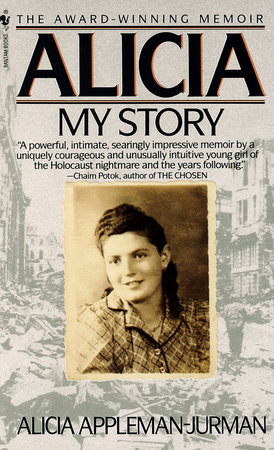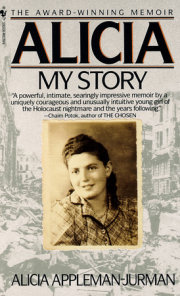CHAPTER 1
Before the War
First they killed my brother Moshe.…
Then they killed my father.…
Then they killed my brother Bunio.…
Then they killed my brother Zachary.…
Then they killed my last brother, Herzl.
Only my mother and I were left. I vowed that I would never let them kill her, that I would protect my mother from the Nazis and their collaborators for as long as I lived.
Love and hate were what motivated my young mind and heart. Love for my dear, gentle mother—and hate for the cruel murderers.
And this is my story.
In 1938, there were eighteen thousand Jewish people in our Polish city of Buczacz, nearly one-third of the total population. Some of the more orthodox Jews wore the classic black frock coats and fur hats, while others dressed just like the rest of the residents and were largely well-integrated into the community.
We had many things to be proud of: the Hebrew schools, the Talmud Torah house, and our joy and pride, the Great Synagogue. It was a very impressive large structure with tall stained-glass windows. It had a small synagogue attached to one side, giving the impression of a father and son standing there proudly. The small synagogue was used for daily prayers, and the large synagogue for the Sabbath and the rest of the holidays.
I was quite familiar with the synagogue, since my older brother Bunio sang in the choir. We had a handsome young rabbi with a beautiful wife, and both were accomplished violinists. The rabbi chose his choir from among the students with good voices who attended Mr. Kofler’s Hebrew school. My brother Bunio, who was an alto, was selected, and so was his friend David, who was a soprano. They were both soloists during the High Holiday prayers. I often listened to their rehearsals, sitting in the semi-darkness of the balcony, where the ladies prayed. My brother’s voice would reach into the depth of my soul and carry me off into the beauty of its words and melody.
It was in this synagogue that Bunio had his Bar Mitzvah. Bunio’s beautiful voice was a sensation. Of course Mama and I had to watch from upstairs, but we could see and hear everything. My youngest brother, Herzl, saved us some of the candies that were thrown at the Bar Mitzvah boy. We had a kiddush at the synagogue, a reception at home, and my mother prepared the midday meal for the students of the Beth Hamidrash—the house of Jewish studies. It was a beautiful day.
Part of being Jewish in Poland was learning to live with anti-Semitism. As a young child I had not encountered Jew-haters, partly because I was born in the remote mountains and also because my parents and older brothers were so protective. I didn’t classify my friends as Jewish or Gentile, although I knew there was a difference between Judaism and Christianity. Life was pretty good, and we were happy—until the first shocking act of anti-Semitism hit our family.
It happened to my oldest brother, Zachary, in May of 1938. He was a student at the conservatory of music in Lvov and was on his way to school, violin case in hand, when a gang of five Polish boys began following him. They were Polish university students. “How about a little music, Jew-boy?” one of them asked. The others laughed. Zachary kept on walking, his eyes looking straight ahead, his fist clenching tighter around the handle of the case.
“What’s the matter, Zhid [Jew],” another boy said. “Are you deaf or something?”
“How can he play the violin if he is deaf?” said another.
“Come on, Zhid, let’s hear you play.”
At that point my brother stopped. Turning around, he appraised the situation. Two of the boys were as tall as he; the others were shorter but stockier. They were all students in school uniforms. “Please, let me go in peace,” Zachary said to them.
The boys surrounded him. “Not until you play us a song.” One of the boys pushed him back roughly; another reached out and snatched away the violin case. My brother lunged toward him, but two others caught him and threw him against a wall, holding his arms firmly. A boy opened the case, took out the violin and bow, and began to make sawing noises on the instrument while the others laughed. “Well, it’s no wonder you wouldn’t play for us,” he said. “This thing isn’t worth anything.” With that he bent over and smashed the violin against the pavement. With a cry Zachary broke free and threw himself forward, nearly reaching the boy. He was stopped by a swift kick in the stomach, which doubled him over with pain and took away his breath. That was when the boys fell upon him, kicking and punching. They held him by the hair and slammed his head against the pavement. They kicked him in the ribs, took turns holding his arms so the others could beat him, and finally left him there in the street, his broken violin a few feet away. He was helped by a Jewish music student who brought him back to his room.
Zachary came home to Buczacz by train with his wounds still fresh. I will never forget how my father paced back and forth as my mother examined Zachary and bandaged him. We were all there in the kitchen, all except for Bunio, who had choir practice and would be home later. I thought of him there at the synagogue, singing his heart out, not knowing his older brother had been beaten and humiliated.
The first time I really became aware of Germany and what was going on in Europe was when I went to get my father at Horovitz’s candy store, where he was engaged in a game of billiards in the back room. I was waiting for him while sitting in a chair and eating an ice cream cone. Nearby, two men were smoking and talking. I did not pay much attention at first, but the word “war” caught my attention. I knew from history books about wars, and I had seen Papa’s medal for bravery, which he had earned as an Austrian officer in the First World War. I also knew that wars could be terrible. One of the men insisted that Germany was going to move east no matter what, and there was going to be a war. Austria had already been invaded and Poland was going to be next, he continued. But the other man was more optimistic, saying that England was not going to let this happen. They kept mentioning other countries I had studied in my geography class, and suddenly the maps I had drawn seemed more real and threatening. I was loyal to my country and did not want anything to happen to it.
On the way home I mentioned this conversation to my father and his face became very sad. I knew his parents were in Austria and so were many of his friends. I realized suddenly that there was a lot going on that we children did not know and that I, at the age of eight, was too young to understand. Yet, from that day on I kept asking questions, and the answers I got frightened me.
But life had to go on, including school and Hebrew classes, and homework and friends, so I let things go; but the seed of worry was planted in my mind, and it grew. During the summer of 1938, which I spent at my uncle’s home in Stanislavov where he practiced medicine, I tried to find out what was going on from my friend Milek, but he could not explain things to me. He did not know too much himself. My uncle was very busy that summer caring for his sick patients, and, as usual, he was very loving and wanted me to have a good time. He probably knew in his heart that the war would soon begin.
Copyright © 2011 by Alicia Appleman. All rights reserved. No part of this excerpt may be reproduced or reprinted without permission in writing from the publisher.








